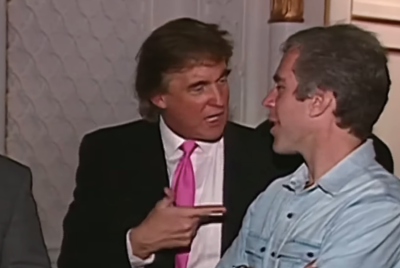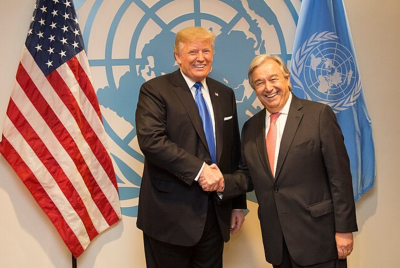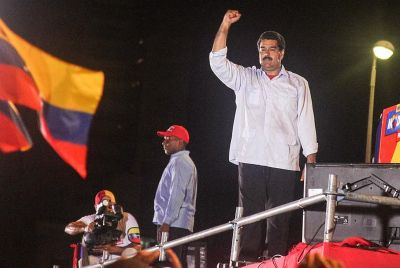'We Are Not Red Or Blue—We Are Golden': McDonald's Emails Workers After Donald Trump's Visit
Trump's McDonald's visit drew social media backlash, and experts warn of risks for big brands in politics

McDonald's has been the centre of political discussion after hosting former US President Donald Trump at one of its franchises in Pennsylvania. While the event garnered significant attention, McDonald's swiftly moved to clarify its neutral stance on the upcoming 2024 US presidential election.
Trump's Visit Draws Attention to McDonald's
During his visit, Trump took on a unique role at the suburban Philadelphia McDonald's, working behind the fry station and answering questions at the drive-thru window. The visit was organised by Derek Giacomantonio, the franchise owner-operator, who reached out to McDonald's corporate headquarters after learning of Trump's interest in visiting one of the company's Pennsylvania locations.
While the visit brought a flurry of media attention, the restaurant was closed to the public for the duration of Trump's appearance. The company was careful to frame the event as one driven by local enthusiasm rather than corporate endorsement.
McDonald's Reinforces Political Neutrality
In response to the buzz surrounding the visit, McDonald's USA sent an email to its employees emphasising the company's long-standing policy of political neutrality. "McDonald's does not endorse candidates for elected office, and that remains true in this race for the next president. We are not red or blue—we are golden," the email stated.
The company clarified that its values centre around inclusivity and welcoming all customers, regardless of political affiliation. "Upon learning of the former President's request, we approached it through the lens of one of our core values: we open our doors to everyone," McDonald's explained in its employee memo. This approach has also extended to other political figures, with McDonald's confirming that franchisees have also invited Democratic nominee Kamala Harris and her running mate, Governor Tim Walz, to visit its restaurants.
Political Ties Acknowledged But Not Endorsed
While McDonald's has tried to avoid becoming a focal point of political campaigns, it recognises that its brand is a part of the broader election conversation. Vice President Kamala Harris has regularly mentioned her time working at McDonald's during her college years, citing the job as a source of extra income. Trump, however, has publicly doubted her story, claiming without evidence that she is lying.
Despite these conflicting narratives, McDonald's stayed above the fray, stating in its employee memo that it is proud of Harris's memories of working at the fast-food chain. The company also highlighted the well-known statistic that "1 in 8" Americans have worked at McDonald's at some point in their lives, further solidifying its deep-rooted connection to American culture.
"What makes '1 in 8' so powerful is the shared experience so many Americans have had," McDonald's noted in its internal communication, showcasing the company's influence across generations.
Social Media Backlash and Public Reactions
Unsurprisingly, Trump's appearance at McDonald's triggered a polarising response on social media. The hashtag "#BoycottMcDonalds" briefly trended on Twitter, and Google searches for "boycott McDonald's" spiked following the event. Some users pledged to avoid the fast-food chain due to its association with the former president.
Chris Hydock, a marketing professor at Tulane University's Freeman School of Business, warned that brands could face backlash when associated with divisive political figures. "When brands become linked to polarising candidates, customers who oppose those candidates tend to react more strongly than those who support them," Hydock explained.
For smaller companies, aligning with a controversial figure can sometimes boost brand visibility. However, Hydock noted that such moves are more likely to alienate a portion of the customer base for a global brand like McDonald's. "Trump working at McDonald's won't attract new customers," he added. "It could just anger some people."
PR Experts Say McDonald's Will Endure
Despite the social media uproar, many public relations experts believe the McDonald's negative fallout will be short-lived. Lori Rosen, president of the Rosen Group, argued that the significant media attention generated by Trump's visit outweighs the backlash. "The publicity from having former President Trump work at one of their franchises already surpasses the negative chatter on social media," Rosen said.
Bruce Newman, a professor in business ethics and marketing at DePaul University, echoed this sentiment, suggesting that the company has skilfully capitalised on the opportunity to remain at the forefront of the public's mind. "McDonald's looks like the company that's getting attention from the presidential candidates, and it heightens awareness of their brand," Newman explained.
He added that Trump may have been attempting to soften his image by trading his usual suit for a McDonald's apron, aiming to present a more casual and relatable persona to voters.
Staying Golden Amidst Political Divides
As the election season intensifies, McDonald's remains committed to its core values of inclusivity and community. In its internal email, the company thanked its employees for upholding those values and continuing to serve customers with "great pride." The message also highlighted the strength of McDonald's brand, noting that "McDonald's resonance and relevance is stronger than ever."
In a final nod to its staff, McDonald's praised the dedication of its teams, stating, "The strength of our brand always comes down to our people... your efforts and our collective belief in the power of us—all three legs of the stool."
© Copyright IBTimes 2025. All rights reserved.






















